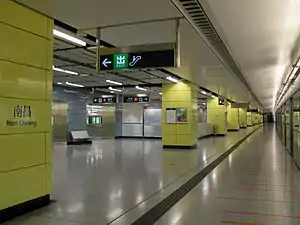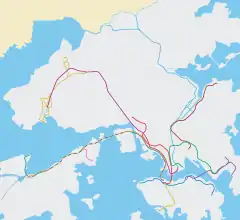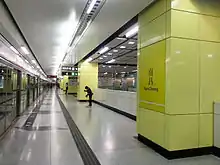Nam Cheong station
Nam Cheong is a MTR interchange station located at ground level beneath West Kowloon Highway, in Sham Shui Po, Hong Kong opposite the Fu Cheong Estate. It is served by the Tung Chung line and West Rail line and provides cross-platform interchange between platform 1 (West Rail line towards Tuen Mun) and platform 4 (Tung Chung line towards Hong Kong). The livery of Nam Cheong station is pale yellow green.
| MTR rapid transit station | |||||||||||||||||||||||||||||||||||||||||||||||||||||||||||||||||||||||||||||||||||||||||||||||||||||||||||||||||||||||||||||||||||||||||
 Platform 4 | |||||||||||||||||||||||||||||||||||||||||||||||||||||||||||||||||||||||||||||||||||||||||||||||||||||||||||||||||||||||||||||||||||||||||
| Chinese name | |||||||||||||||||||||||||||||||||||||||||||||||||||||||||||||||||||||||||||||||||||||||||||||||||||||||||||||||||||||||||||||||||||||||||
| Chinese | 南昌 | ||||||||||||||||||||||||||||||||||||||||||||||||||||||||||||||||||||||||||||||||||||||||||||||||||||||||||||||||||||||||||||||||||||||||
| Cantonese Yale | Nàamchēung | ||||||||||||||||||||||||||||||||||||||||||||||||||||||||||||||||||||||||||||||||||||||||||||||||||||||||||||||||||||||||||||||||||||||||
| Literal meaning | South(wards) thriving | ||||||||||||||||||||||||||||||||||||||||||||||||||||||||||||||||||||||||||||||||||||||||||||||||||||||||||||||||||||||||||||||||||||||||
| |||||||||||||||||||||||||||||||||||||||||||||||||||||||||||||||||||||||||||||||||||||||||||||||||||||||||||||||||||||||||||||||||||||||||
| General information | |||||||||||||||||||||||||||||||||||||||||||||||||||||||||||||||||||||||||||||||||||||||||||||||||||||||||||||||||||||||||||||||||||||||||
| Location | West Kowloon Highway near Fu Cheong Estate, Sham Shui Po Sham Shui Po District, Hong Kong | ||||||||||||||||||||||||||||||||||||||||||||||||||||||||||||||||||||||||||||||||||||||||||||||||||||||||||||||||||||||||||||||||||||||||
| Coordinates | 22°19′36″N 114°09′12″E | ||||||||||||||||||||||||||||||||||||||||||||||||||||||||||||||||||||||||||||||||||||||||||||||||||||||||||||||||||||||||||||||||||||||||
| Operated by | MTR Corporation | ||||||||||||||||||||||||||||||||||||||||||||||||||||||||||||||||||||||||||||||||||||||||||||||||||||||||||||||||||||||||||||||||||||||||
| Line(s) | |||||||||||||||||||||||||||||||||||||||||||||||||||||||||||||||||||||||||||||||||||||||||||||||||||||||||||||||||||||||||||||||||||||||||
| Platforms | 4 (island platform and 2 side platforms) | ||||||||||||||||||||||||||||||||||||||||||||||||||||||||||||||||||||||||||||||||||||||||||||||||||||||||||||||||||||||||||||||||||||||||
| Connections | Bus, public light bus | ||||||||||||||||||||||||||||||||||||||||||||||||||||||||||||||||||||||||||||||||||||||||||||||||||||||||||||||||||||||||||||||||||||||||
| Construction | |||||||||||||||||||||||||||||||||||||||||||||||||||||||||||||||||||||||||||||||||||||||||||||||||||||||||||||||||||||||||||||||||||||||||
| Structure type | At-grade, not covered (Tung Chung Line) At-grade, fully covered (West Rail Line) | ||||||||||||||||||||||||||||||||||||||||||||||||||||||||||||||||||||||||||||||||||||||||||||||||||||||||||||||||||||||||||||||||||||||||
| Platform levels | 1 | ||||||||||||||||||||||||||||||||||||||||||||||||||||||||||||||||||||||||||||||||||||||||||||||||||||||||||||||||||||||||||||||||||||||||
| Disabled access | Yes | ||||||||||||||||||||||||||||||||||||||||||||||||||||||||||||||||||||||||||||||||||||||||||||||||||||||||||||||||||||||||||||||||||||||||
| Other information | |||||||||||||||||||||||||||||||||||||||||||||||||||||||||||||||||||||||||||||||||||||||||||||||||||||||||||||||||||||||||||||||||||||||||
| Station code | NAC | ||||||||||||||||||||||||||||||||||||||||||||||||||||||||||||||||||||||||||||||||||||||||||||||||||||||||||||||||||||||||||||||||||||||||
| History | |||||||||||||||||||||||||||||||||||||||||||||||||||||||||||||||||||||||||||||||||||||||||||||||||||||||||||||||||||||||||||||||||||||||||
| Opened |
| ||||||||||||||||||||||||||||||||||||||||||||||||||||||||||||||||||||||||||||||||||||||||||||||||||||||||||||||||||||||||||||||||||||||||
| Services | |||||||||||||||||||||||||||||||||||||||||||||||||||||||||||||||||||||||||||||||||||||||||||||||||||||||||||||||||||||||||||||||||||||||||
| |||||||||||||||||||||||||||||||||||||||||||||||||||||||||||||||||||||||||||||||||||||||||||||||||||||||||||||||||||||||||||||||||||||||||
| |||||||||||||||||||||||||||||||||||||||||||||||||||||||||||||||||||||||||||||||||||||||||||||||||||||||||||||||||||||||||||||||||||||||||
| Location | |||||||||||||||||||||||||||||||||||||||||||||||||||||||||||||||||||||||||||||||||||||||||||||||||||||||||||||||||||||||||||||||||||||||||
 Nam Cheong Location within the MTR system | |||||||||||||||||||||||||||||||||||||||||||||||||||||||||||||||||||||||||||||||||||||||||||||||||||||||||||||||||||||||||||||||||||||||||
Nam Cheong station was originally the southern terminus of the West Rail line before the opening of Kowloon Southern Link on 16 August 2009. The Airport Express passes between the tracks of the Tung Chung line without stopping at this station. A public transport interchange, located to the east of the station, allows for transfers to other modes of public transport. Architecture firm Aedas designed Nam Cheong station.[1]
Although this station is on ground level, platform screen doors are fitted.
History
Nam Cheong station was called Yen Chow Street station (after Yen Chow Street, a major thoroughfare in the area) in its planning stage. The station was subsequently renamed "Nam Cheong" after Nam Cheong Estate, a nearby public housing estate, which in turn is named after Nam Cheong Street (another thoroughfare). Nam Cheong Street was named after Mr. Chan Nam Cheong (陳南昌), a local philanthropist. As "Nam Cheong" is also the Cantonese-based transliteration for Nanchang, some sources mistakenly state that the station was named after the mainland Chinese city.
Works for Nam Cheong station started on 5 October 2000; the station was built by a joint venture formed by Balfour Beatty and Zen Pacific.[2] The station was opened for public use on 16 December 2003, coinciding with the pre-opening charity trial run day of the KCR West Rail (now West Rail line), and the Tung Chung line part of the station started operation. On 20 December, the KCR West Rail officially commenced operation, and Nam Cheong became the southern terminus of the rail line.
Upon its completion, the station was a shared-use integrated station between MTR and KCR, and the first integrated one between the two systems. The station concourse was divided into two parts (managed by the two rail operators respectively). Special transfer turnstiles were located between the two parts, enabling passengers paying with Octopus card to interchange between the two systems by tapping their card just once.
The operations of MTR and KCR merged on 2 December 2007, and the management of the station unified under MTRCL. Following the network-wide fare zone merger of the former MTR and KCR networks on 28 September 2008, the transfer turnstiles along with the barriers separating the two fare zones were removed, and cross-platform interchange is now provided between platform 1 (West Rail line towards Tuen Mun) and platform 4 (Tung Chung line towards Hong Kong); several passageways were opened between the two platforms. One of the wider passages is aligned with the fifth and sixth carriages of the Hong Kong-bound trains on the Tung Chung line platform.
The Kowloon Southern Link extension of West Rail line opened on 16 August 2009, and the West Rail line was extended to Hung Hom on that day. Nam Cheong lost its status as the southern terminus of West Rail line, and became an intermediate station for both Tung Chung and West Rail lines.
Station layout
.JPG.webp)

.JPG.webp)
All four platforms are located at ground level. The platforms are curved because they were built around the existing tracks. However, the gaps are not very large.
Before the merge of fare systems on 28 September 2008, Octopus card users transferring between the West Rail line and Tung Chung line had to use the transfer gates separating fare areas the MTR and KCR systems. Once the card was placed on a reader, the first section of journey fare would be deducted and passengers could walk over to the other fare area. Passengers who accidentally walked to the wrong area by mistake had to exit the station through the exit gates (not the transfer gates) within 15 minutes, or an extra fare was charged.
| 1 | First Floor | Firemen and staff only (not open to public) |
| G | Platforms, Exits | Transport interchange |
| Side platform, doors will open on the left | ||
| Platform 3 | Tung Chung line towards Tung Chung (Lai King) → | |
| Airport Express | Airport Express (does not stop here) → | |
| Airport Express | ← Airport Express (does not stop here) | |
| Platform 4 | ← Tung Chung line towards Hong Kong (Olympic) | |
| Island platform, doors will open on the left | ||
| Platform 1 | West Rail line towards Tuen Mun (Mei Foo) → | |
| Wall | ||
| Platform 2 | ← West Rail line towards Hung Hom (Austin) | |
| Side platform, doors will open on the left | ||
| C | Concourse | Customer Service Centre, vending machines |
| Tickets/fare adjustment, shops, toilets | ||
| vending machines, ATMs | ||
Entrances and exits
Transport connections
- Kowloon Motor Bus
- 12: Hoi Lai Estate - Tsim Sha Tsui East (Mody Road)
- 12A: Cheung Sha Wan (Sham Mong Road) - Whampoa Garden
- 18: Cheung Sha Wan (Sham Mong Road) - Oi Man Estate (Circular Route)
- 36A: Cheung Sha Wan (Sham Mong Road) - Lei Muk Shue
- 286C: Cheung Sha Wan (Sham Mong Road) - Ma On Shan (Lee On Estate)
- 296C: Hoi Ying Estate - Sheung Tak
- New World First Bus
- 701: Hoi Lai Estate - Mong Kok (Circular Route)
- 702: Hoi Lai Estate - Sham Shui Po (Yen Chow Street) (Circular Route)
- 702B: Pak Tin Estate - Hoi Ying Estate (Circular Route)
- 702S: So Uk Estate - Cheung Sha Wan (Sham Shing Road)
- 971: Hoi Lai Estate - Aberdeen (Shek Pai Wan)
- Citybus
- A21: Hung Hom Station - Airport (Ground Transportation Centre)
- Cross Harbour Bus
- 118: Cheung Sha Wan (Sham Mong Road) - Siu Sai Wan (Island Resort)
- 914: Hoi Lai Estate - Causeway Bay (Tin Hau station)
- 914P Hoi Lai Estate → Causeway Bay (Tin Hau station)
- 914X: Hoi Lai Estate → Causeway Bay (Tin Hau station)
- Public light bus
References
| Wikimedia Commons has media related to Nam Cheong Station. |
- "Designers transfer Hong Kong know-how to Dubai's new metro". scmp.com.
- Government of Hong Kong Environmental Protection Department
- "Nam Cheong Station layout" (PDF). MTR Corporation. Retrieved 28 March 2015.